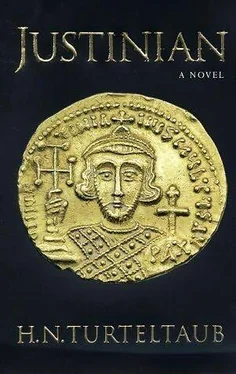Harry Turtledove - Justinian
Здесь есть возможность читать онлайн «Harry Turtledove - Justinian» весь текст электронной книги совершенно бесплатно (целиком полную версию без сокращений). В некоторых случаях можно слушать аудио, скачать через торрент в формате fb2 и присутствует краткое содержание. Жанр: Историческая проза, на английском языке. Описание произведения, (предисловие) а так же отзывы посетителей доступны на портале библиотеки ЛибКат.
- Название:Justinian
- Автор:
- Жанр:
- Год:неизвестен
- ISBN:нет данных
- Рейтинг книги:3 / 5. Голосов: 1
-
Избранное:Добавить в избранное
- Отзывы:
-
Ваша оценка:
- 60
- 1
- 2
- 3
- 4
- 5
Justinian: краткое содержание, описание и аннотация
Предлагаем к чтению аннотацию, описание, краткое содержание или предисловие (зависит от того, что написал сам автор книги «Justinian»). Если вы не нашли необходимую информацию о книге — напишите в комментариях, мы постараемся отыскать её.
Justinian — читать онлайн бесплатно полную книгу (весь текст) целиком
Ниже представлен текст книги, разбитый по страницам. Система сохранения места последней прочитанной страницы, позволяет с удобством читать онлайн бесплатно книгу «Justinian», без необходимости каждый раз заново искать на чём Вы остановились. Поставьте закладку, и сможете в любой момент перейти на страницу, на которой закончили чтение.
Интервал:
Закладка:
"This is but another barbarous error on the part of western clerics," the ecumenical patriarch said. "Have they forgotten the words of the book of Matthew: 'What therefore God hath joined together, let not man put asunder'? For your reference," he added slightingly, as if Basil could not be expected to know, "this is the sixth verse of the nineteenth chapter."
Paul spoke as if explaining proper doctrine to a child, not to a fellow churchman. The bishops under the jurisdiction of the see of Constantinople made only the slightest efforts to conceal their amusement, having long since wearied of the arrogant pretensions of the popes, who, dwelling in the ruins of what was once a great city, think to dictate doctrine to the entire civilized world.
Basil of Gortyna held his temper. He said, "Practice in the west differs, and the differences are of long enough establishment to be tolerated under the principle of economy."
George and Daniel, Pope Sergios's regular legates in Constantinople, nodded in agreement. But Paul shook his head, saying, "The principle of economy covers differences of ritual without doctrinal importance. That cannot be said of rules pertaining to the proper ordination of priests and deacons."
Basil looked mournful. "The holy pope will not care to set his signature on canons going dead against the custom in his patriarchate."
He and the papal legates wrangled on with the ecumenical patriarch and the bishops from within the Roman Empire for some time over this matter and others, such as the canon that- only reconfirming the acts of the second and fourth ecumenical synods- placed Constantinople with Rome in patriarchal privilege, ranking after it only in the listing of the patriarchates.
I heard much of this later, for I did not attend all these sessions of the fifth-sixth synod, having other matters to occupy my attention. Chief among these was the return of the Cypriots, who again petitioned me to let them leave their island and settle within territory under the sole rule of the Roman Empire.
Where I had refused them before, I now accepted their pleas, resettling a good many of them in Bithynia, not far from the imperial city. Thanks to Abimelekh's insolent provocations with his coins and papyrus sheets, I was more inclined toward war than I had been previously, and, thanks to the exertions of Neboulos, who to my amazement was building his army to the size he had promised, more confident of the outcome.
In my honor, the Cypriots renamed the town in which I resettled them New Justinianopolis. This touched me even more than it might have otherwise, for their luck during the resettlement was not good: a storm sank some of the ships carrying them to their new home, while a pestilence raged among them after the transfer. But they sent John, whose acquaintance I had already made, to the fifth-sixth synod. Despite his previous foolishness, I was glad to see him there, as a sign of their making themselves at home.
Not long after the Cypriots had been moved to New Justinianopolis, Cyril the engraver asked for an audience with me. "Emperor, I have it!" he cried upon rising after prostrating himself.
"Splendid," I said agreeably, pleased to see one of my subjects so diligent in his service to me. I have it! being imperfectly informative, though, I asked, "What do you have?"
"The way you were seeking, Emperor; to show the deniers of Christ the folly of the ways and the glory of the true and holy faith," he answered.
I leaned forward on the throne; he had indeed engaged my interest. "Show me what you have," I said, and beckoned him to me, a rare privilege for an artisan, even one so skilled as Cyril.
As he approached, he reached down to a pouch he wore on his belt. A couple of the excubitores who stood nearest the throne stepped between him and me, pointing their spears at him with warning growls. But he had not come with assassination in mind; all he drew from the leather pouch was a sheet of papyrus on which he had been sketching in charcoal.
The papyrus, I saw, was one of the new sheets from Egypt, one on which the customary cross had been replaced by verses from the work of the Arabs' false prophet. That made Cyril's sketches all the more glorious, for they could have been taken to symbolize Christianity's triumph over the wicked doctrines Mouamet preached.
One sketch showed a Roman Emperor recognizably resembling me standing by and holding a step-mounted cross, a cross such as had been commonplace on the reverse of Roman nomismata for centuries. Cyril had lettered an inscription around the rim of the circular sketch: D. IUSTINIANUS SERVUS CHRISTI. Most of the letters were Latin, only a few Greek. "Lord Justinian, servant of Christ," he said, translating it into the tongue that had replaced Latin for most purposes in the Empire.
I nodded, but absently, for I was looking at the other sketch, which was of our Lord. Cyril had portrayed Him as Christ Pantokrator; the Ruler of All, His right hand flexed in a gesture of benediction, His left holding a book. The cross on which He was crucified appeared behind His head. Here the inscription read, again in a mixture of Latin and Greek letters, IES. CRISTOS REX REGNANTIUM. "Jesus Christ, King of Rulers," Cyril translated. He looked up at me. "Emperor, a nomisma with this on it will tell the followers of the false prophet what we think of him and of them."
"It will," I breathed. Coins go everywhere within the Roman Empire, and, thanks to the unchanging fineness of our gold, far beyond as well. A story told by a certain Kosmas, who sailed to India during the reign of my namesake, a century and a half before my time, comes to mind. An Indian prince asked him and a Persian merchant who was also present at his court which of them had a mightier sovereign. The Persian, of course, at once claimed his king was the mightier.
But Kosmas told the Indian prince, "Both rulers are here. By their coins shall you judge them." The Persian's silver was not bad in its way, but could not stand comparison to the gleaming Roman nomismata. And so the prince rightly judged the Emperor of the Romans mightier than the Persian King of Kings.
"One thing concerns me," I told Cyril. "These drawings are large"- each was broader than the palm of my hand-"but a nomisma is small, scarcely the width of my thumb. Will you be able to reproduce them accurately in that cramped space?"
He drew himself up, the picture of affronted pride. "Emperor, my work satisfied your father, and it has always satisfied you up to now. Do you think I would do anything less than my best when making an image of our Lord?"
"I'm sorry," I said, one of the few times- in fact, thinking back, the only one I can remember- I ever apologized while sitting on the imperial throne. "How soon can you strike examples to show me?"
Cyril got a faraway look in his eye. "I would say three days, Emperor, but, like I told you, I want this to be my very finest work. Will five days do?"
"That will be fine," I said, having expected some considerably longer time. Looking back, I should have known better, for some of the coins the palace servitors threw to the crowds of Constantinople at my coronation bore my image, not my father's. The engravers could, at need, work very fast indeed.
And Cyril proved as good as his word- in fact, one day better. When he handed me the first five nomismata he had struck, I brought them close to my face and squinted at them, hardly believing he had managed to include so much in so small a compass. I could make out the individual hairs, long and flowing, on Christ's head and in His beard and mustache; I imagined I could read (though in truth I could not) the words on the book He was holding. On the reverse, my own image was also impressively detailed, down to the three jeweled pendants dangling from the fibula that held my chlamys closed.
Читать дальшеИнтервал:
Закладка:
Похожие книги на «Justinian»
Представляем Вашему вниманию похожие книги на «Justinian» списком для выбора. Мы отобрали схожую по названию и смыслу литературу в надежде предоставить читателям больше вариантов отыскать новые, интересные, ещё непрочитанные произведения.
Обсуждение, отзывы о книге «Justinian» и просто собственные мнения читателей. Оставьте ваши комментарии, напишите, что Вы думаете о произведении, его смысле или главных героях. Укажите что конкретно понравилось, а что нет, и почему Вы так считаете.












